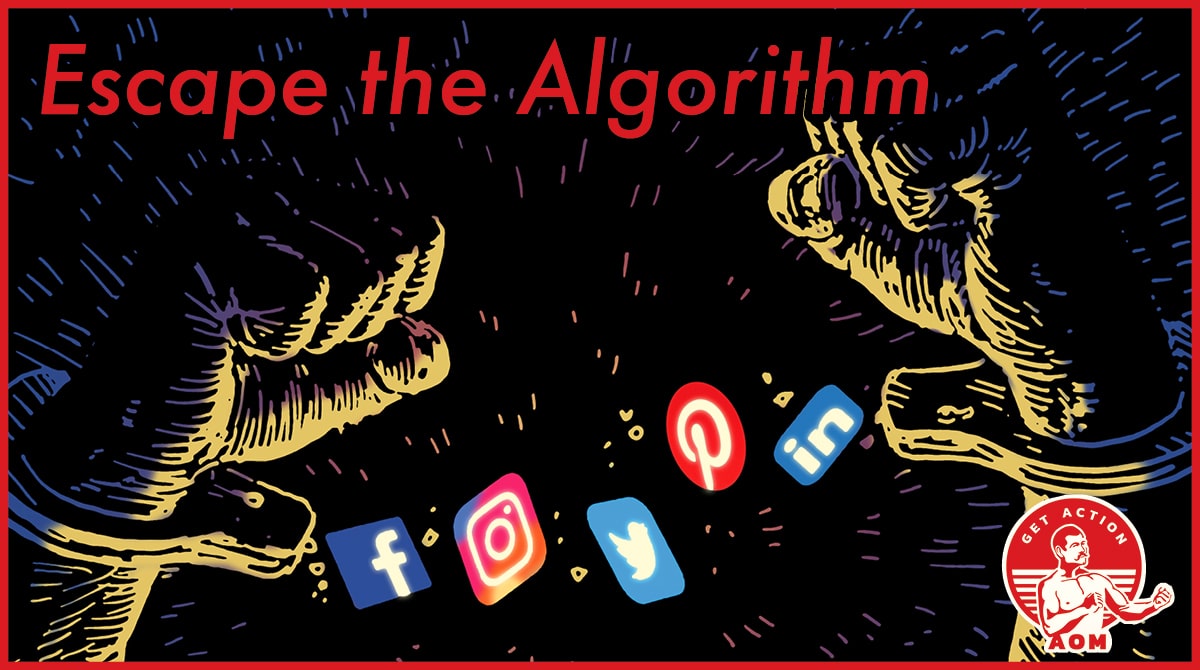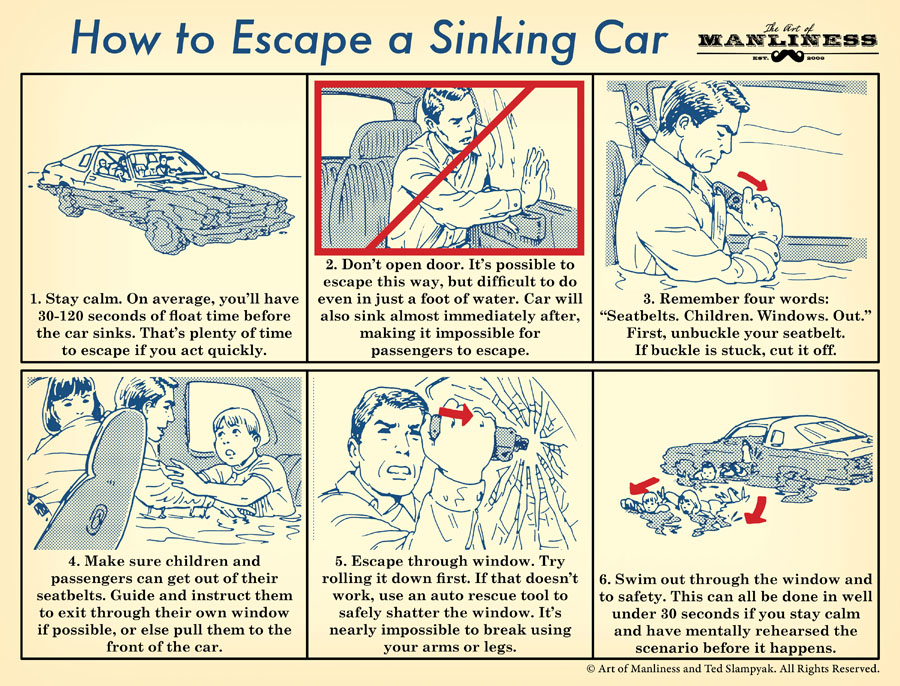
The way I consumed information online radically changed on July 1, 2013. Before that date I was an avid Google Reader user. After July 1, I stopped being a Google Reader user because Google shut it down.
For those of you who don’t remember Google Reader, it was an RSS feed aggregator.
For those of you who don’t know what RSS is, it stands for “real simple syndication.”
RSS is a web feed that most websites have that allows you to read information from a website without actually going to the website. A lot of the internet runs on RSS feeds — you just don’t realize it. For example, if you subscribe to the AoM podcast on iTunes or Spotify, iTunes and Spotify are using the RSS feed for my podcast to get my podcast on their respective platforms.
Way back in the 2000s, before Twitter was much of a thing and before Facebook was being used as a publishing platform, a lot of people followed a website’s RSS feed to stay up to date on their latest articles. You could input all of the feeds from your favorite websites to an RSS feed aggregator, like Google Reader, so you could read all of your favorite websites in the same place. It was like having your own personalized daily newspaper. It was amazing!
But when Google Reader shut down, I stopped using RSS feeds. There were other feed aggregators out there, but they weren’t as easy to use as Google Reader.
So I started getting my online content the way most people get it today: Twitter, Facebook, and other social media sites.
At first, it wasn’t so bad. But then I started noticing that I wasn’t seeing all the updates from pages I followed on Facebook. Come to find out, Facebook started changing their News Feed algorithm so that only the content Facebook thought you’d be interested in the most showed up in your feed. Facebook claimed they were just trying to help users sift through the firehose of information being blasted at them. Critics argued Facebook was just trying to keep people more engaged on Facebook because that makes money for Facebook. And that they were trying to force pages to pay money for their content to show up in the News Feeds they had once shown up in organically. I was just ticked that I wasn’t seeing all the stuff from Facebook pages that I had deliberately opted into getting updates from.
Twitter added changes to their algorithm that boosted tweets to the top of your timeline based on what they thought you’d want to see. Again, Twitter claimed they were trying to be helpful. Critics argued it was just a ploy for users to engage with and stay on Twitter longer (which makes Twitter more money). I was miffed some algorithm was deciding what I saw.
Besides resenting the fact that an automated computer program was shaping what I paid attention to in order to make an international corporation more money, I started to sour on another facet of consuming content from social media: the social aspect.
Before I clicked on a link from Facebook to an article that looked interesting to me, comments from a bunch of internet randos jumped out from the screen, offering an often ill-informed hot take, that, 9 times out of 10, was based entirely on the headline; they hadn’t actually read the piece. Same thing on Twitter. I was confronted with other people’s opinions about an article, before I had the chance to read it and form my own.
Besides the comments, there are those other little signals on social media that can end up skewing what you think of something: likes, RTs, faves, hearts.
And come to find out, a lot of these “one-bit indicators” (as Digital Minimalism author Cal Newport calls them) are coming from bots. Not from actual people. A lot of social media is fake. Hype.
To paraphrase my childhood sports hero Frank Thomas: “You shouldn’t believe the hype.”
So over the past few years, I’ve slowly been opting out of the hype machine of social media in my personal life. I deleted my personal Facebook account a few years ago, and I stopped checking Twitter last year. My personal Instagram account has gone dormant. (I’ve been moving AoM away from social media too: we’ve stopped checking and sharing content on Facebook, automate 99% of what we share on Twitter, and use Instagram sparingly).
To keep up on the things that interest me, I’ve wandered back to using technologies from 2008: RSS and email. I’ve returned to using an online RSS aggregator to keep up on the sites that I enjoy, and I’ve also subscribed to a few email newsletters from companies and individuals who put out stuff I like perusing.
My information consumption has escaped the algorithm and let me tell you, it feels amazing. Since ceasing to use social media to get my content and relying on these two pre-social media technologies instead, my life has improved significantly in several ways:
I see the content I want to see. One of the blogs I enjoy is Marginal Revolution, by economist (and AoM podcast guest) Tyler Cowen. If I were to follow Marginal Revolution on Facebook, there’s a good chance that I wouldn’t see all their updates. But since I follow Marginal Revolution via RSS, I never miss any of them.
Am I interested in everything Marginal Revolution puts out? Of course not, but instead of some stupid social media algorithm trying to predict whether I’ll be interested in a piece of content or not, I get to decide whether I’m interested in it or not. It’s nice being in complete control of my media consumption again.
I no longer see other people’s opinions about content before I consume said content. When you subscribe to a site’s RSS feed, you just see the content. That’s it. There are no comments or social media feedback about that content. Instead of the hot take of some internet stranger tainting how I read something, I read it completely unfiltered and come to my own conclusions.
Reading content without the social media commentary is a way to practice self-reliance. Instead of relying on other people to help you figure out what you think of something, you get to figure that out yourself. You’re in charge, and being in charge of your opinions feels good.
I spend less time online. AoM podcast guest John Zeratsky calls Facebook, Twitter, and Instagram “infinity pools.” They’re apps in which the content is continually refreshed, and thus has no “end.” You might use Twitter to follow some “thought leader” you enjoy, but besides the stuff he puts out, you’re also presented with all the comments that his followers append to his tweets. There’s a constant stream of new content and commentary on Twitter, and as our brains desire novelty, that makes the platform massively appealing to check over and over again. You’re never done reading content on social media.
Now that I just consume my content via RSS or email, I’ve found myself spending less time online. I check my RSS feeds in the morning and in the evening. That’s it. Since there’s no social commentary on RSS feeds, there’s no reason to keep checking back to see what other people had to say. You just read the article and you’re done. There’s some finitude to it.
I rest easy knowing that social media companies have less data on me. Social media companies don’t charge you money to use their services, but that doesn’t mean the services are “free.” Instead of exchanging money, you hand over gobs of personal and private information about yourself, which allows social media companies to sell ads targeted to your personal dossier.
What’s more, these companies (particularly Facebook) have a lousy track record of keeping your private information private.
The rugged, individualistic, keep-out-of-my-business side of myself treasures his privacy. I like for other people or companies to not know what’s going on in all facets of my life. While I’ll likely never be able to completely eliminate my digital footprint, reducing my social media use can significantly shrink it.
I’m happier. One of the things I’ve noticed about not using social media is that I just feel happier. I think there’s a couple of things going on there.
First, because I’m spending less time online I have more time to do things I enjoy in real life.
Second, most of the commentary on social media skews negative because negativity gets attention and attention is the coin of the online realm. Because I don’t see the opinions of the masses on RSS or email, I don’t expose myself to all the negativity that plagues social media. I’ve noticed I’m less pissy the less I’m exposed to the low-grade fever of anger that constantly brews online.
Third, social media can really skew what your brain considers important. I remember when I was a Twitter junkie, I had this feeling that all the commentary and controversies were super important. If everyone on Twitter was talking about it, it had to be important, right?
Not really.
One thing I’ve learned by taking a step back from Twitter is that whatever feels important on Twitter usually isn’t that important in “meat space.” I’ve had people tell me about Twitter controversies and but for them telling me about them, I wouldn’t have known about those “happenings” at all. My life continued to go on as normal when I didn’t know about them, and my life continued to go on as normal after I learned about them secondhand.
Now that I’m off social media, my brain’s bandwidth is no longer clogged up with all that faux-important social media garbage. My attention is focused on the stuff that’s really important: family, friends, health, spirituality, and of course, barbell training.
Research actually confirms that you’ll be happier once you stop using social media. Who doesn’t want to be happier?
How to Escape the Algorithm
Life’s great outside the social media algorithm. It is for me at least.
Maybe you’ll enjoy it, too.
If you’re looking to escape the algorithm, below I offer a few suggestions on how to do that:
Use RSS feeds to consume content. Over the past few years, several RSS feed aggregators have come out on the market that serve as great replacements for Google Reader. They all work pretty much the same way, with a few minor differences. Find one that works for you.
- Feedly. This is what I use. They have a free version and a paid version.
- Feedreader
- Feeder
- The Old Reader
- Inoreader. Inoreader has a more visual feel to it. Sort of like Flipboard.
Here are some of the blogs/sites I personally follow on Feedly:
- Marginal Revolution. The blog of one of my favorite writers, the aforementioned Tyler Cowen. Tyler shares his thoughts on economics and how it intersects with culture. I love his daily digest of links to check out. It’s taken me on some unexpected paths on the web.
- Abnormal Returns. I discovered this finance/investing blog because the owner, Tadas Viskanta, often links to AoM in his daily link round-ups. Another source of interesting and eclectic finds across the web that cover topics of finance, investing, psychology, and business.
- Cal Newport. I’ve been following Cal’s blog for almost a decade now. I started out following him in law school because of his study tips, but continued to follow him as he developed his ideas of Deep Work and Digital Minimalism. On his blog, Cal continues to flesh out the ideas that he explored in his books. Always prescient.
- Brain Pickings. Maria Popova is a curator of the art of living a flourishing life. She reads widely and condenses lessons from great scientists, writers, philosophers, artists, statesmen, and theologians. Always pleasantly surprised at what pops up in my feed from Brain Pickings.
- Farnam Street. We’ve had Shane Parrish, the owner of Farnam Street, on the AoM Podcast. I can’t remember how I discovered his blog, but Farnam Street has been in my feed for several years now. Each week, Shane introduces a mental model to help readers think more clearly about life.
- Kottke. Jason Kottke is one of the old breed of bloggers. He’s been at it for years. Each day he highlights random, but often fascinating stuff he finds on the web. I still enjoy receiving his gleanings.
You can join 163k other folks in following AoM on RSS: Here’s our feed. We provide the full text of our articles in our feed, meaning you can read all of our content in your respective RSS reader without having to come over to our site. And yes, it’s free.
Sign up for email newsletters. I love a well-crafted and curated email newsletter. I can read a newsletter at my leisure and go back to it if I want. A few newsletters (and they’re all free!) that I enjoy are:
- Kyle’s Files. Kyle Eschenroeder, an AoM contributor and author of The Pocket Guide to Action, compiles excerpts from books he’s been reading as well as interesting articles he finds around the web. I’ve discovered a lot of cool quotes, books, and ideas thanks to his newsletter. One of the things that I like about Kyle’s Files is that there’s no set schedule. He only sends something out when he has something to say. The randomness of the schedule makes it a delight when I see it pop up in my inbox.
- Ryan Holiday’s Reading List. Once a month, writer Ryan Holiday puts out a list of books he’s been reading along with his take on them. I’ve discovered several great reads thanks to his list.
- The Hustle. Daily newsletter that summarizes the latest business news in an off-beat, fun way. On Sundays, they do deep dives into interesting business-related topics like the rise and fall of Sharper Image.
- What to Read Next. AoM podcast producer and managing editor Jeremy Anderberg puts out a weekly email of what he’s been reading lately. What I like about Jeremy’s email is that he often highlights fiction, which is something you typically don’t see in book lists/emails.
- Barbell Logic Friday Fahve. My barbell coach and head of Starting Strength’s online coaching, Matt Reynolds, puts out a weekly newsletter called Friday Fahve (the “Fahve” comes from how the founder of Starting Strength, Mark Rippetoe, pronounces the number 5 — as in “Do fahve reps!”). Great content on strength training, nutrition, and mindset for barbell training.
The Art of Manliness offers two email newsletters:
- Daily newsletter. Delivered every morning at 6AM CT, our daily newsletter contains the full text of the article/podcast show notes that we published the day before.
- Weekly digest. Delivered Sunday morning, our weekly digest contains links to all the articles/podcasts that we published that week so you can pick and choose which ones you want to read.
A few notes on our newsletter: 1) it’s free, 2) we have not nor ever will sell our email list to advertisers looking to SPAM people, 3) if you haven’t opened a single email in six months, your email is deleted from our list.
Sign-up for the newsletter here.
Use dedicated/news reader/messaging apps. If neither RSS nor email is your thing, you can follow some sites via their dedicated apps (AoM’s got one), on news reader apps like Apple News or Flipboard (AoM’s on both), or via messaging apps (Telegram, Messenger, WhatsApp, etc.; you can follow AoM this way too). With these options, you receive the content of websites directly on your phone, without some algorithm filtering things for you or commentary from internet strangers. And when you get content via text, it’s easy to share and discuss with your friends — with just your actual social network.
Taking the Training Wheels Off Your Internet Browsing
In my podcast interview with Cal Newport about the philosophy of “digital minimalism,” he made a distinction between the social internet (“the idea that you can use the internet to connect with people, express yourself, and discover interesting information”), and social media (platforms that present and curate online content). While Newport is a big booster of the former, he’s “less a fan of this notion that we need to consolidate the social internet behind the walled gardens of these massive, private companies”:
That’s really where the problems start to happen. When you have massive companies like Facebook say, ‘Hey, look. You guys are too dumb to enjoy the social internet. It’s too complicated for you. We’ll make an easier-to-use version of it. We got to get everyone to sign on to our easier-to-use version of the internet, but we’ll give you a really clean interface.
‘You don’t really have to go discover things, we’ll just kind of show you things. We’ll watch you and see what you like. You can just sit there like the people on the spaceship in that Pixar movie Wall-E. Just sit there and we’ll just kind of feed you things that will make you happy and you’ll like it. Don’t worry about it. The internet’s too difficult for you to actually go out there and engage with.’ This movement of let’s take this social internet, which is wild and decentralized and wonderful and disruptive and something I love, and let’s consolidate it into a small number of private companies. That’s where all the problems are happening.
Almost everything that people are upset about with social media today is because we thought that the social internet has to exist on the private servers of two or three companies. I like the social internet. I don’t like social media. I think if you leave the walled garden of social media and go back out to the wild web, you can find interesting things. You can connect to interesting people. You could express yourself in interesting ways and you can do it in a way that’s just so much healthier because you don’t have these algorithmic forces trying to push you into weird extremes, or to pacify you, or to get you upset, or to get you mollified, or whatever’s going on that’s necessary to get revenue up at these private companies.
When you go back out to the wild social internet, it’s such a better experience. This is why I’ve been a blogger for a long time. I think the blogosphere, though weirder and harder to navigate, is, for example, a much better repository of expression and information than say Facebook or Twitter is. . . .
Facebook wants us to think that it’s fundamental. I think it’s more like what AOL was in the 1990s. It was the world wide web with training wheels for people who didn’t know how web browsers work.
Facebook is just the social internet with training wheels for people who don’t want to actually take the time to go out there and explore actual websites and different protocols and more peer-to-peer-type stuff.
Algorithms control what you see, and as what you pay attention to becomes your reality, algorithms create your reality. If you want to program your own reality, rather than having it programmed by corporate computer coding, then escape the algorithm, escape social media, take the training wheels off your online content consumption, and ride it in a more direct, autonomous, liberated way.
Also listen to our podcast with Cal Newport about digital minimalism:







